Optimizing a WooCommerce store for search has become far more complex than adding keywords to product pages. Modern search engines and AI platforms interpret structure, meaning, and data consistency to decide which products deserve visibility. That’s why choosing the best SEO plugin for WooCommerce is now about more than titles or descriptions, it’s about how intelligently your store communicates with search engines and AI systems. DefiniteSEO brings that intelligence to WordPress, giving WooCommerce stores a complete SEO framework that blends technical precision, schema automation, and AI-ready optimization. This guide explains how DefiniteSEO enhances every part of WooCommerce, from metadata and structured data to sitemaps, social tags, and scoring, helping store owners build eCommerce sites that are truly optimized for the future of search.
Best SEO Plugin for WooCommerce: Table of Contents
- Rethinking WooCommerce SEO for the Age of AI
- Why eCommerce SEO Demands More Than Keywords
- The Foundation of DefiniteSEO’s WooCommerce Compatibility
- Intelligent Metadata: Product Titles and Descriptions That Scale
- Product Schema and Entity Optimization
- Global WooCommerce Settings for Search and Structure
- Managing URLs, Visibility, and Noindex Controls
- Advanced Sitemap Configuration and Index Management
- GTIN, ISBN, and MPN: Building Trust with Product Identifiers
- Social Optimization: Open Graph and Twitter Cards for Every Product Type
- Diagnosing SEO Health with DefiniteSEO’s Points to Improve
- WooCommerce SEO Scoring and Performance Measurement
- Preparing for Generative and AI Search
- Conclusion: Future-Proofing WooCommerce with Structured SEO
- FAQs
For years, WooCommerce has been the most flexible eCommerce platform for WordPress users. Yet, optimizing it for search has always required multiple plugins, custom scripts, and complex schema markup. Today, the landscape is changing. Search engines no longer evaluate just keywords they interpret structured meaning, relationships between entities, and even the quality of data that describes a product.
This shift calls for a new kind of SEO tool, one that doesn’t just insert metadata but understands how search, AI assistants, and generative engines interpret that data. DefiniteSEO was built around that philosophy. It is a modern SEO system that unifies traditional optimization practices with future-focused AI readiness, designed to help WooCommerce stores thrive in both human and machine-driven search contexts.
DefiniteSEO’s compatibility with WooCommerce ensures that store owners, marketers, and developers can manage every part of product SEO, from metadata to schema without conflicts or code edits. The result is a system that speaks directly to Google, Bing, and emerging AI engines, giving your products a structured voice in the evolving search ecosystem.
Why eCommerce SEO Demands More Than Keywords
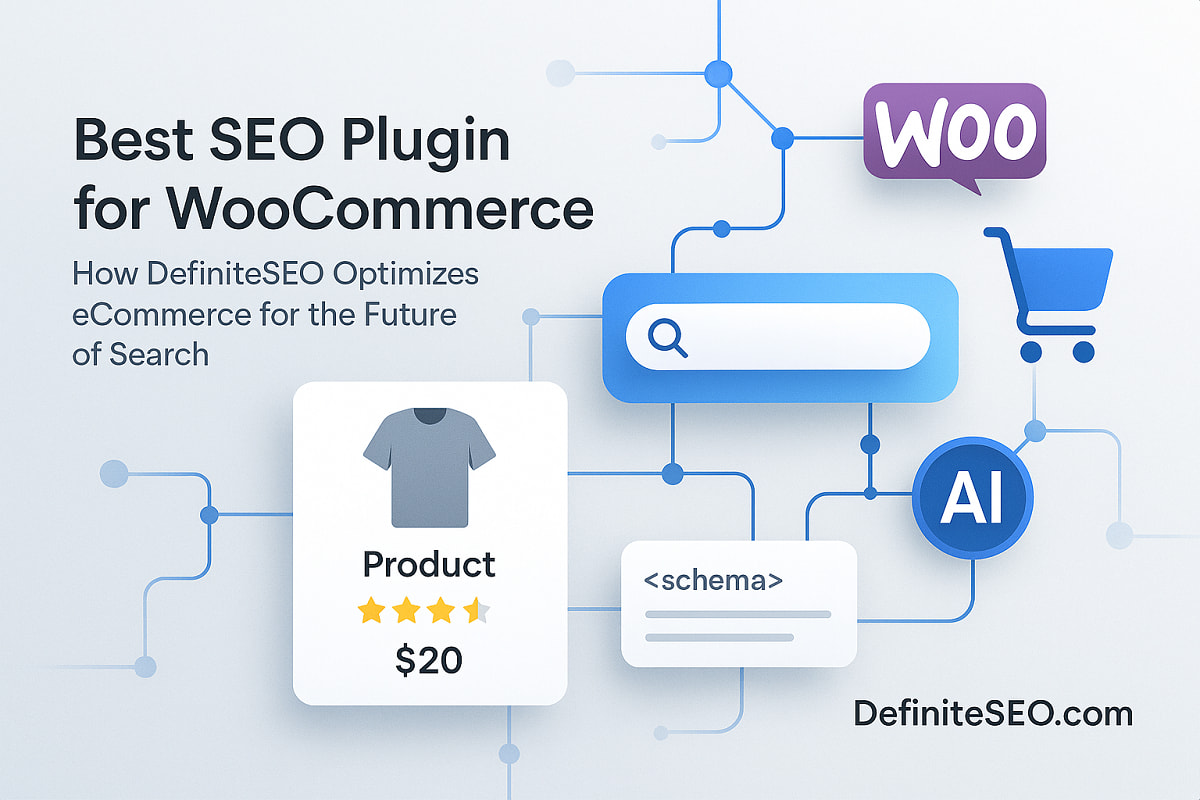
For eCommerce websites, SEO is not about repeating a keyword in product titles or descriptions. It’s about clarity of meaning. A search engine must be able to determine not just what you sell, but who the product is for, what attributes define it, and how it compares to alternatives.
WooCommerce, by default, provides limited SEO structure. It offers product pages and categories, but doesn’t organize data in a way that search engines fully understand. This often leads to poor representation in search snippets and inconsistent product listings in Google Shopping.
DefiniteSEO addresses these challenges directly. It ensures that every WooCommerce element from a product tag to a shipping class carries contextual metadata. Instead of raw text, your product data becomes a structured map that both human users and AI engines can interpret correctly.
By managing schema, Open Graph tags, and sitemaps intelligently, DefiniteSEO eliminates the typical fragmentation between SEO, social previews, and structured search results. It converts the WooCommerce store into a cohesive, semantically optimized environment ready for both organic and AI-driven discovery.
The Foundation of DefiniteSEO’s WooCommerce Compatibility
DefiniteSEO doesn’t just work with WooCommerce, it integrates natively. Once activated, it detects your WooCommerce environment and dynamically enables product-level SEO options across the dashboard. These include product title templates, schema controls, canonical management, and sitemap visibility.
The plugin interacts directly with WooCommerce’s database architecture, so it recognizes product types, categories, attributes, and tags. From there, it provides independent SEO control for each. You can adjust settings globally or refine them per taxonomy type, ensuring precise metadata without repetitive configuration.
This native integration also means that DefiniteSEO adapts automatically to WooCommerce updates. It doesn’t overwrite templates or rely on fragile hooks. Instead, it builds on WordPress’s native metadata systems, guaranteeing long-term stability and performance.
What makes this foundation particularly powerful is how it prepares your store for semantic search. Every adjustment in DefiniteSEO strengthens the data relationships across your catalog, something search engines and AI systems use heavily to determine product relevance and authority.
Intelligent Metadata: Product Titles and Descriptions That Scale
For most WooCommerce store owners, managing SEO metadata is one of the most tedious parts of optimization. DefiniteSEO simplifies this by allowing users to define product title and description templates using both static text and dynamic variables.
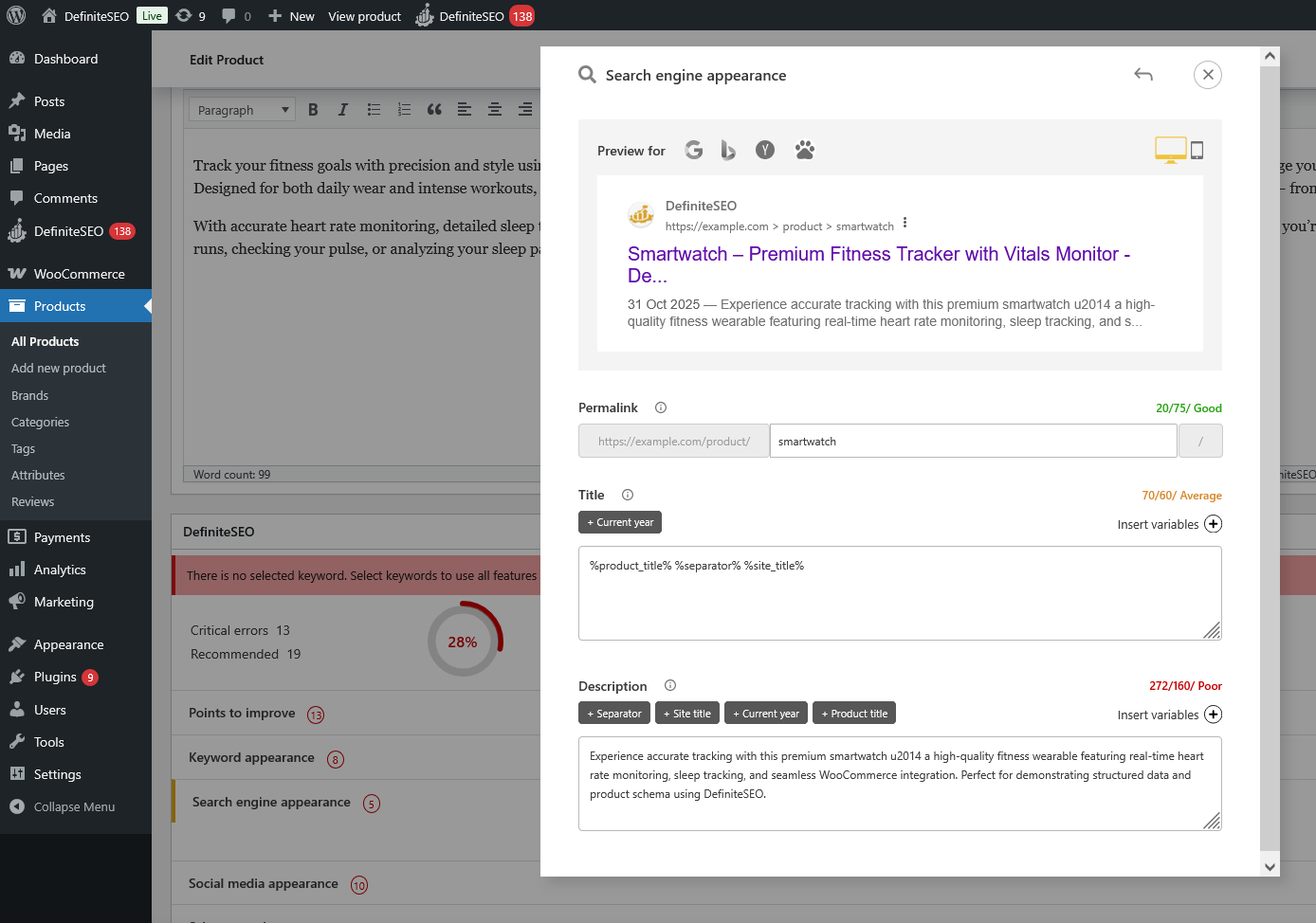
For instance, you can configure a format like:
%product_title% %separator% Buy Online at %site_title%
This ensures every product inherits an optimized and readable meta title automatically, even as new items are added. The same approach applies to meta descriptions, where you can combine structured keywords with dynamic variables for scale and personalization.
More importantly, DefiniteSEO applies this system across all major WooCommerce taxonomies:
- Product Categories
- Brands
- Product Tags
- Product Shipping Classes
Each taxonomy has independent SEO title and description settings, allowing total control over how your store communicates its structure to search engines.
This modular metadata framework ensures that your WooCommerce site maintains SEO consistency, regardless of catalog size. It also prevents duplicate meta tags, a common issue that causes ranking dilution.
DefiniteSEO then checks for missing or incomplete metadata and lists them as actionable improvements, a feature we’ll explore later.
Product Schema and Entity Optimization
At the heart of modern WooCommerce SEO lies structured data, the schema markup that defines what your product is, not just what it says. DefiniteSEO generates an advanced Product Schema (JSON-LD) for every WooCommerce item.
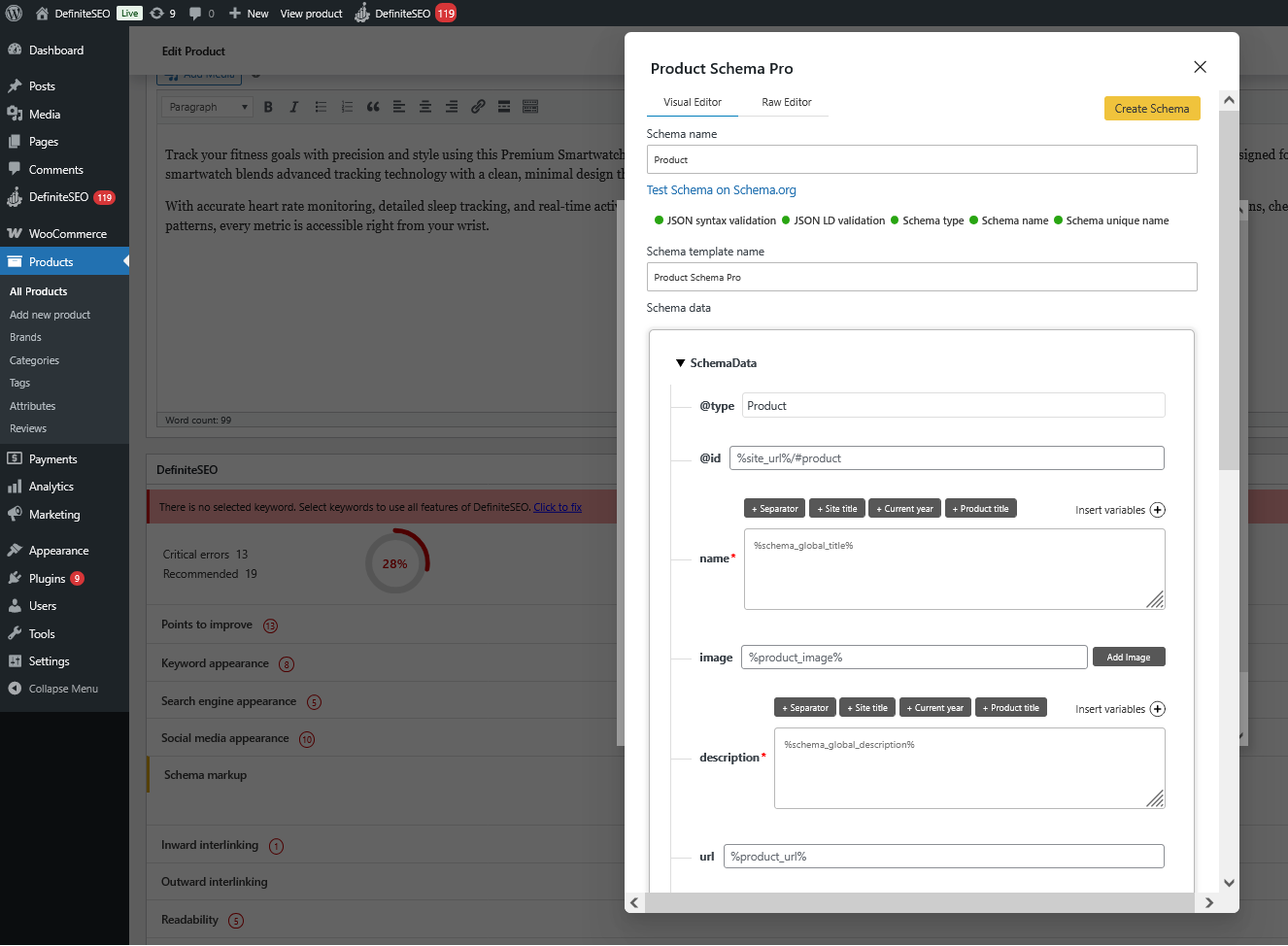
This schema includes all key identifiers and relationships recognized by search engines:
- Product name, description, image, and SKU
- Brand, category, and product type
- Price, currency, and availability
- Aggregate ratings and individual reviews
- GTIN, MPN, and ISBN identifiers
DefiniteSEO ensures this data complies with Google’s rich result standards, improving visibility in both search snippets and shopping results. But its schema does more than meet requirements; it’s designed for entity optimization, the process of making your product machine-recognizable.
In AI search environments, structured data is how engines like ChatGPT, Gemini, and Perplexity interpret relevance. When your product schema is complete and consistent, AI systems can reference your store as a reliable data source. DefiniteSEO’s schema engine ensures that your WooCommerce products meet this future-facing requirement seamlessly.
Global WooCommerce Settings for Search and Structure
DefiniteSEO gives you precise control over how WooCommerce interacts with search engines. The plugin’s Global WooCommerce Settings include several powerful options that influence both SEO and usability.
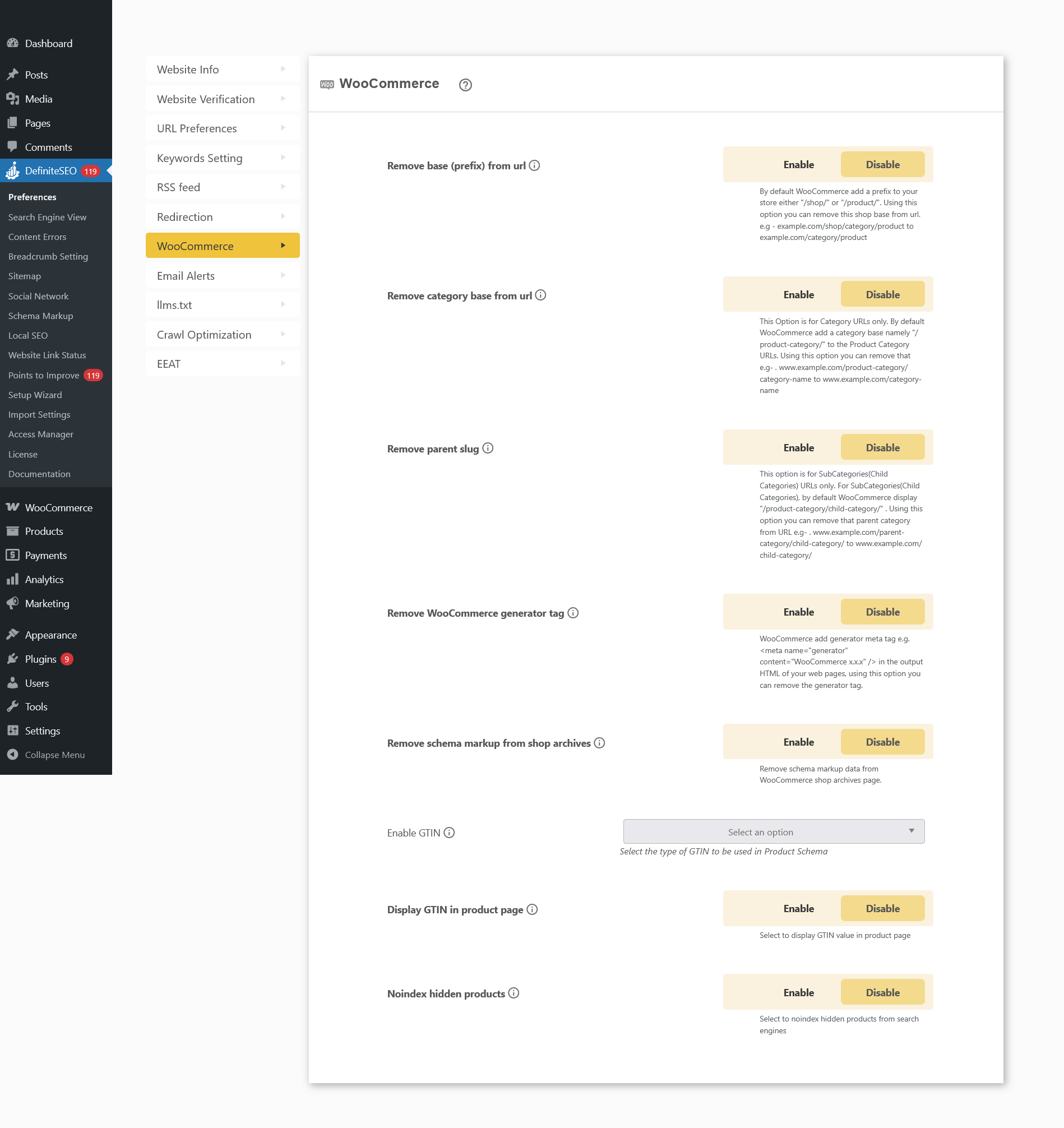
Users can:
- Remove product base (prefix) from URLs for cleaner structures.
- Remove category base to simplify taxonomy paths.
- Remove parent slug for shorter URLs.
- Remove WooCommerce generator tag for leaner HTML.
- Disable schema markup on shop archives if redundant or conflicting.
- Enable GTIN support and display it on product pages.
- Apply “Noindex” to hidden products automatically.
These global settings balance flexibility and control. It allow you to create a URL and metadata structure that aligns with your overall SEO architecture.
By removing unnecessary prefixes and metadata, DefiniteSEO enhances crawl efficiency and canonical clarity. For developers, this translates to fewer indexing issues and cleaner permalink hierarchies, a detail that often differentiates technically strong stores from average ones.
Managing URLs, Visibility, and Noindex Controls
WooCommerce stores often struggle with product visibility conflicts. Hidden or out-of-stock items sometimes remain indexable, creating duplicate or thin-content issues. DefiniteSEO solves this with an intelligent Noindex Hidden Products feature.
When a product is hidden from the front end (via WooCommerce visibility settings), DefiniteSEO help you assigns a noindex meta tag to prevent search engines from crawling it. This keeps your catalog lean and ensures only live, shoppable products are indexed.
The plugin also monitors your visibility configuration, warning you if inconsistencies appear. For example, if a hidden product is still being indexed or linked in your sitemap, DefiniteSEO lists it in your diagnostic panel under “Points to Improve.”
This automation helps store owners maintain clean SEO hygiene without constant manual checks. It reflects the principle that search optimization is not about adding more data but ensuring every piece of data serves a purpose.
Advanced Sitemap Configuration and Index Management
Search engines rely heavily on sitemaps to understand a website’s structure. However, for WooCommerce stores with hundreds or thousands of products, a poorly configured sitemap can become counterproductive. Duplicates, hidden products, or irrelevant categories can waste crawl budget and reduce search efficiency.
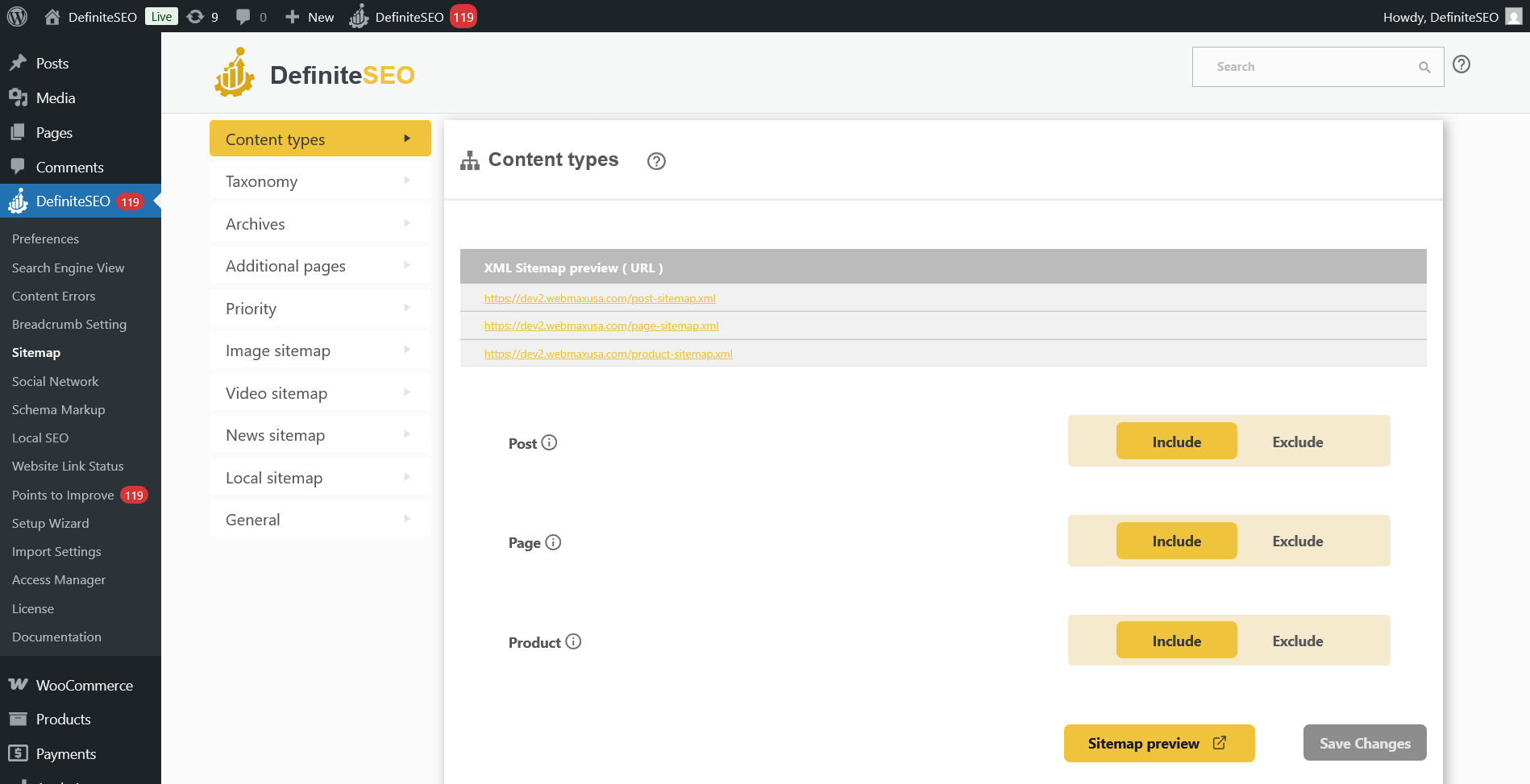
DefiniteSEO gives store owners granular control over sitemap inclusion. Within the Sitemap Manager, you can decide whether products, product categories, or tags should appear in your XML sitemap. Beyond these basics, the plugin lets you refine inclusion for specific WooCommerce taxonomies such as Brands and Product Shipping Classes, offering a level of customization few SEO tools provide.
This selective inclusion is particularly valuable for large stores or marketplaces where not every product or taxonomy contributes meaningful SEO value. By excluding outdated, thin, or duplicate items, you help search engines focus on high-value content.
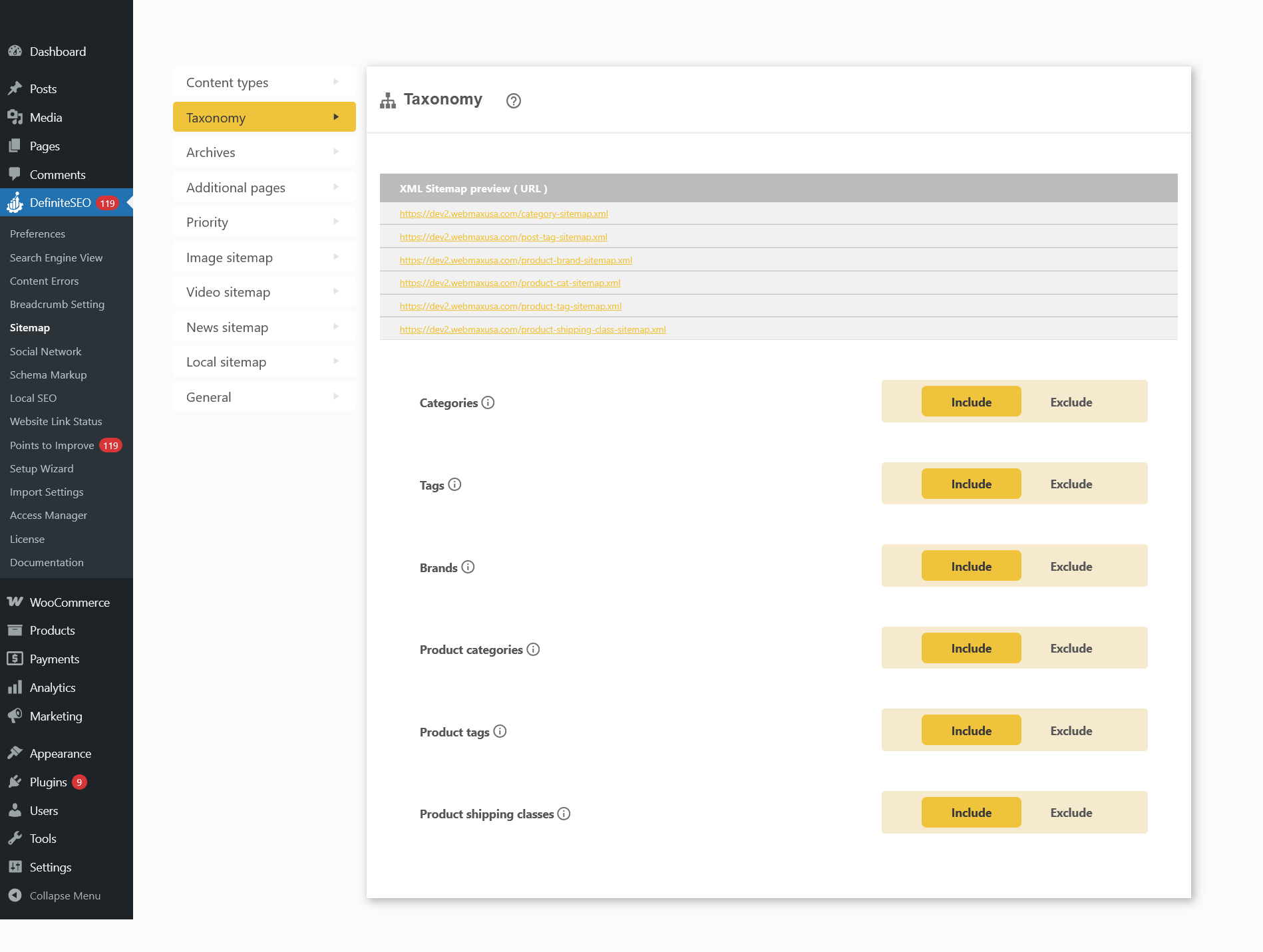
In addition, DefiniteSEO’s sitemap structure automatically aligns with your canonical URLs. If you have chosen to remove bases or parent slugs, your sitemap reflects those choices accurately. This prevents mismatches that could otherwise lead to crawl errors or index confusion.
Together, these controls allow for a sitemap that’s not only clean but strategically designed, a direct reflection of the hierarchy you want search engines to recognize.
GTIN, ISBN, and MPN: Building Trust with Product Identifiers
One of the more overlooked aspects of eCommerce SEO is product identity. Search engines, merchant platforms, and AI engines all rely on identifiers such as GTINs, ISBNs, and MPNs to differentiate one product from another.
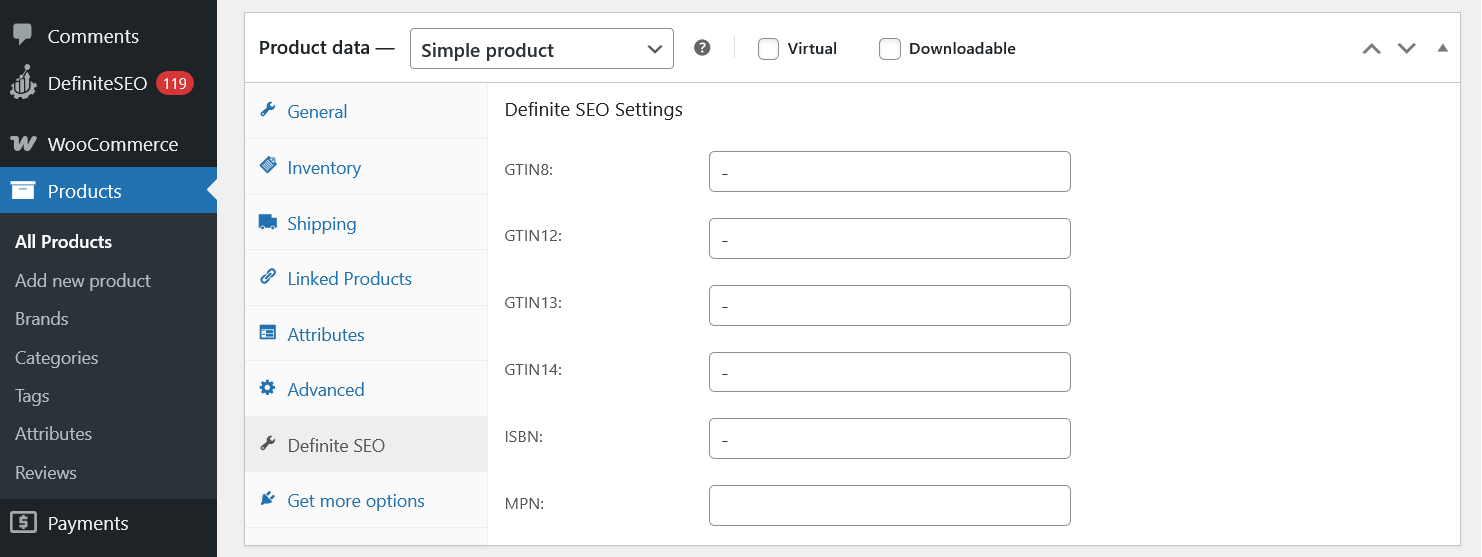
DefiniteSEO integrates this identification process directly into WooCommerce. Store owners can enter GTIN8, GTIN12, GTIN13, GTIN14, ISBN, or MPN values for each product. These identifiers are then automatically embedded into the product’s JSON-LD schema.
Why does this matter? Because identifiers establish credibility. When a product includes these codes, Google can confirm that it represents a specific, legitimate item, improving eligibility for shopping listings, rich snippets, and even AI-curated recommendations.
DefiniteSEO doesn’t just generate schema for these fields; it validates them. If an identifier is missing or misformatted, the plugin flags it in the Points to Improve system, ensuring that your schema remains complete and compliant. For brands with extensive catalogs, this level of detail can be the difference between being featured in rich results or remaining invisible in crowded search spaces.
As AI-driven discovery becomes more prominent, these identifiers will increasingly serve as anchors that connect your product data to global knowledge graphs. DefiniteSEO prepares your store for that semantic web reality, turning your WooCommerce catalog into a recognized, structured dataset.
Social Optimization: Open Graph and Twitter Cards for Every Product Type
Search visibility is only part of modern optimization; social discoverability plays an equally vital role. When products are shared on social platforms, they should appear polished, informative, and brand-aligned. DefiniteSEO automates this process by generating Open Graph (OG) and Twitter Card tags for all WooCommerce entities.
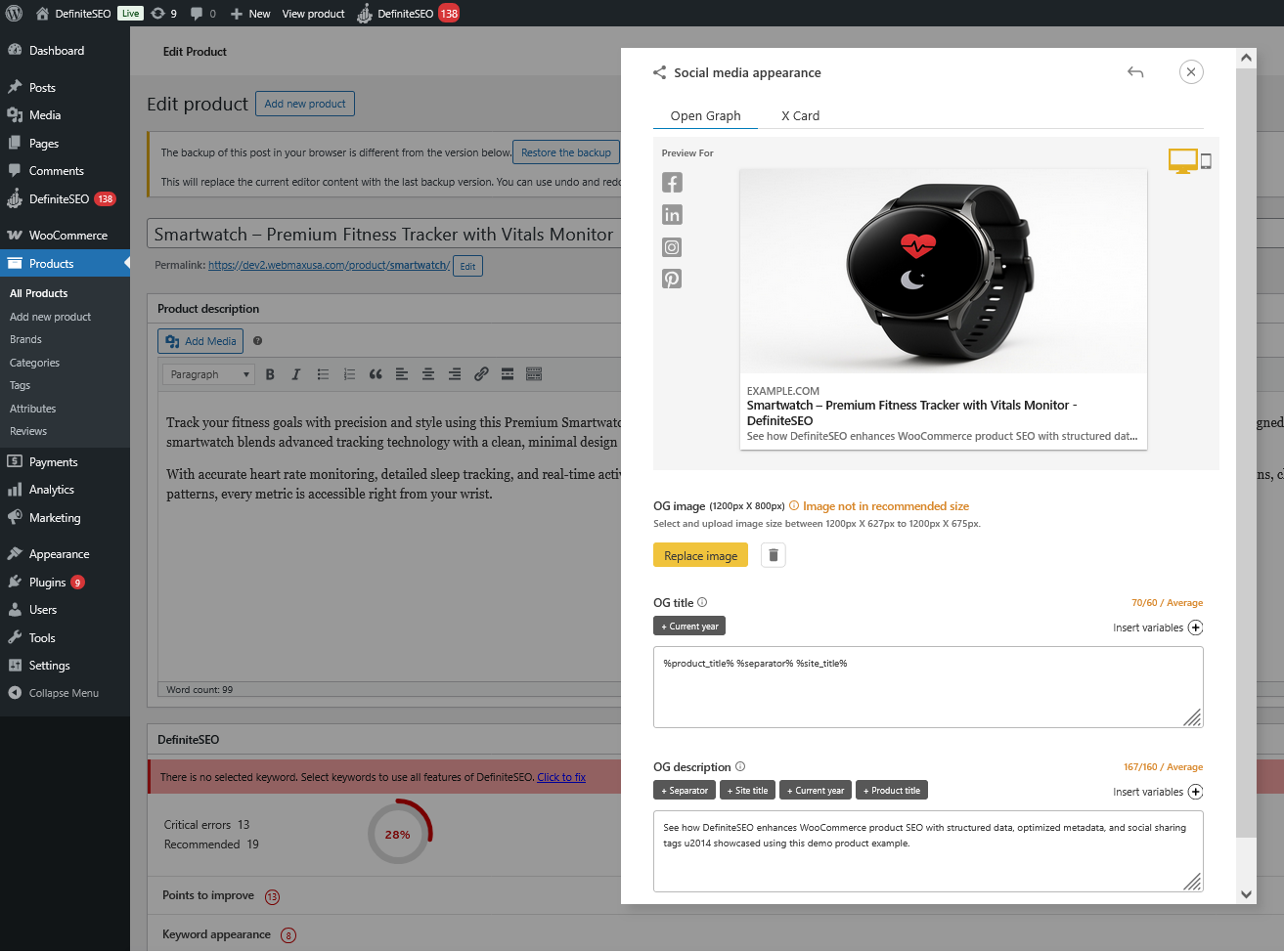
Users can configure OG titles, descriptions, and preview images using static text or dynamic variables. The plugin extends this functionality beyond products to include Product Categories, Brands, Product Tags, and Shipping Classes. This consistency ensures that every link shared whether on Facebook, LinkedIn, or X displays accurate, optimized metadata.
The OG system also integrates seamlessly with your product schema. When a product includes a price, currency, or availability status, that data can be reflected across both schema and OG tags. This alignment ensures that your content appears correctly not only in search results but also across social feeds, improving engagement and click-through rates.
For developers and agencies managing multiple stores, this level of automation eliminates the need for third-party OG or Twitter plugins, simplifying the tech stack while maintaining precise control over branding and content previews.
Diagnosing SEO Health with DefiniteSEO’s Points to Improve
One of DefiniteSEO’s most valuable features is its diagnostic engine, known as Points to Improve. This system analyzes your WooCommerce configuration and identifies missing or misconfigured settings that may impact visibility or data accuracy.
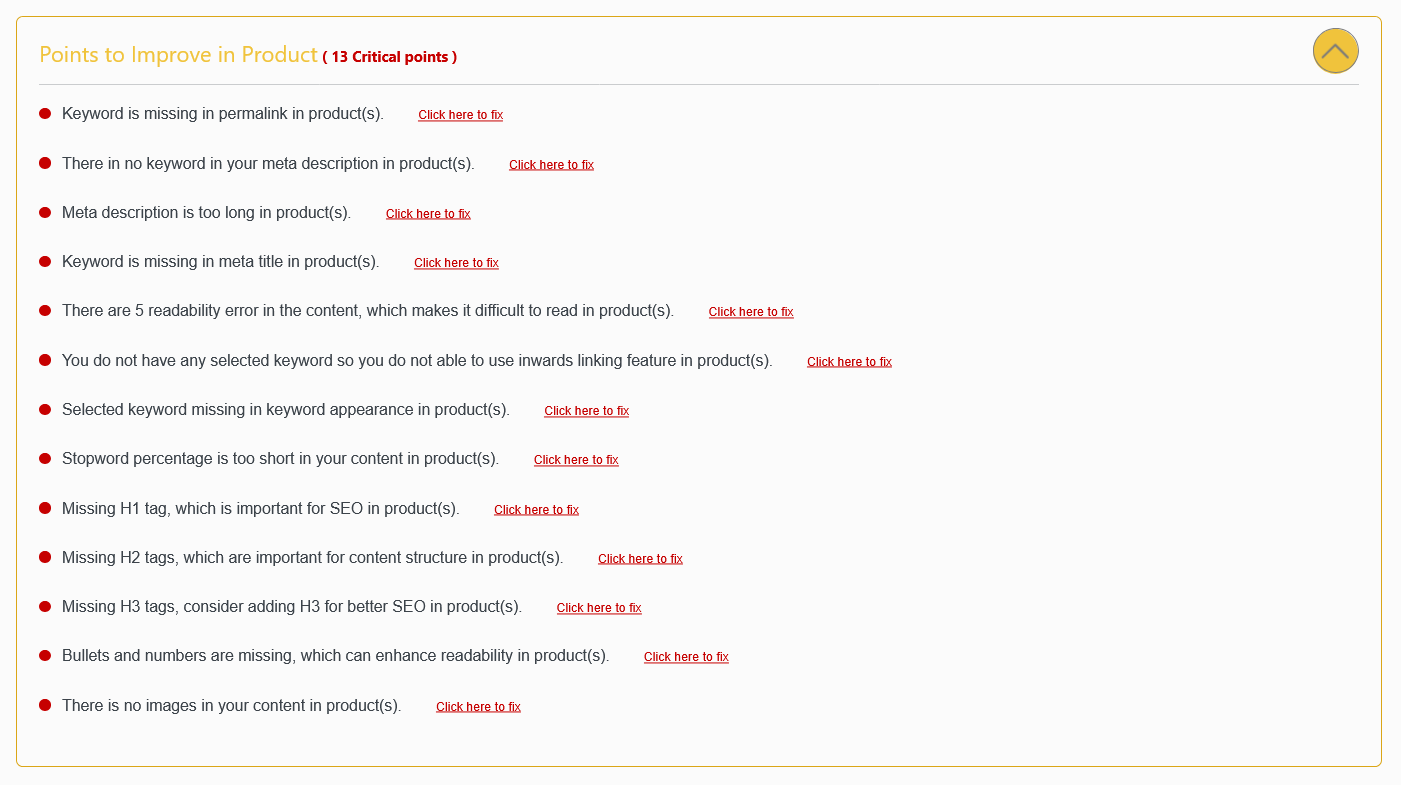
For example, it can detect:
- Missing GTIN, MPN, or ISBN values
- Incomplete product titles or descriptions
- Schema disabled where it should be active
- Noindex applied to visible products
- Sitemap conflicts or taxonomy inclusion errors
- and much more..
Each detected issue is listed in an actionable format with direct links to resolve them. This not only saves time but helps store owners maintain continuous SEO compliance without expert intervention.
The plugin also goes a step further by connecting these improvement points to your overall SEO Score, creating a measurable indicator of how well your store adheres to best practices. This transforms optimization from guesswork into a data-driven process.
The diagnostic framework reflects DefiniteSEO’s larger philosophy: SEO is not a one-time setup; it’s an ongoing state of accuracy. By turning missing configurations into quantifiable improvement points, DefiniteSEO encourages maintenance discipline, the hallmark of a healthy, scalable WooCommerce SEO strategy.
WooCommerce SEO Scoring and Performance Measurement
SEO performance in WooCommerce can’t be judged solely by traffic. A store might have strong rankings yet lack technical consistency or structured clarity. DefiniteSEO addresses this with a comprehensive scoring model that evaluates the quality of SEO implementation across WooCommerce settings.
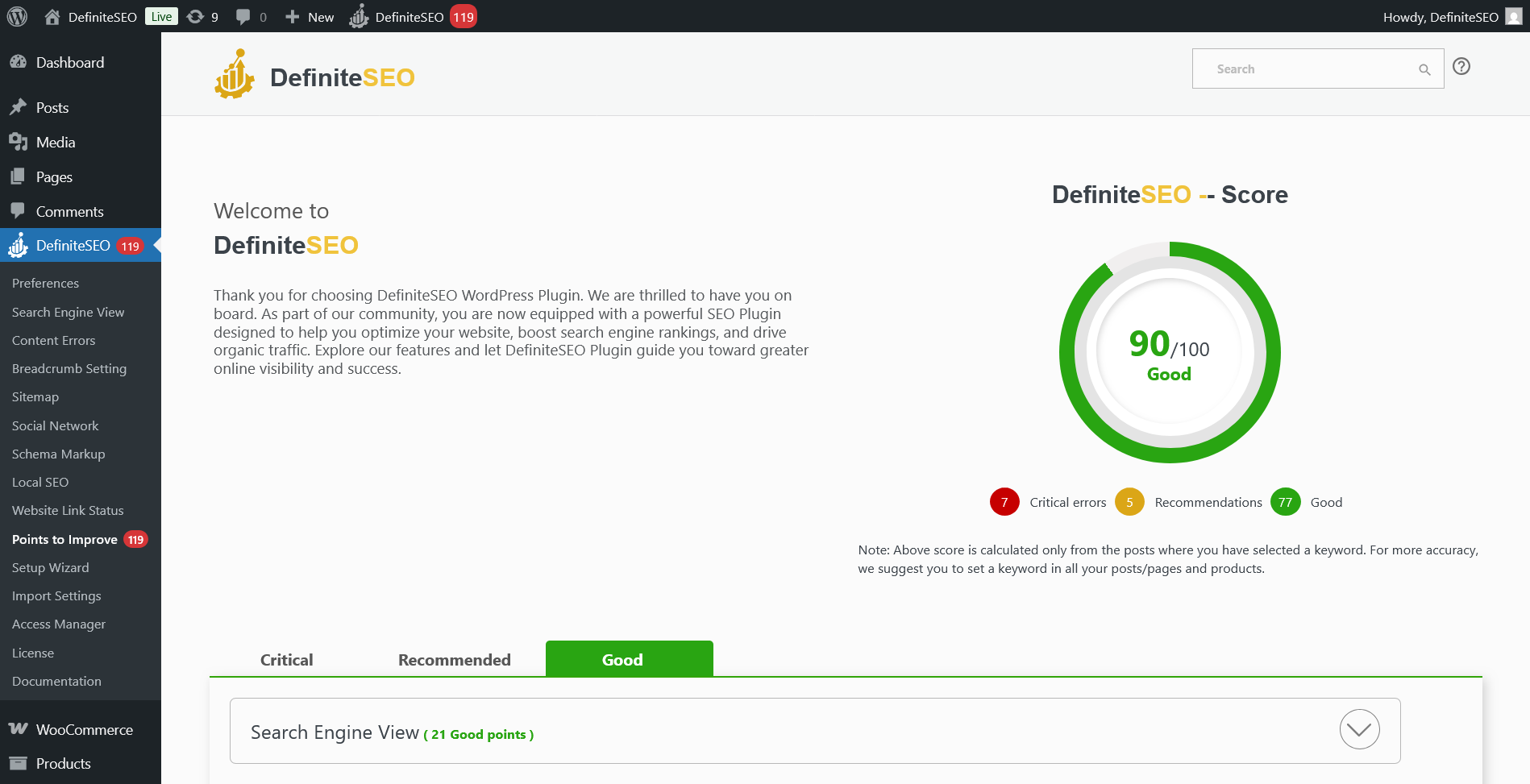
The score adjusts dynamically based on:
- Missing fields like meta descriptions or identifiers
- Incorrect schema configurations
- Improper indexation settings
- Perfectly configured, complete optimization elements
Every change you make to product metadata, schema, or OG tags can influence your score. The system updates automatically, giving you a transparent, numerical view of how well your WooCommerce store aligns with SEO and structured data standards.
For agencies or consultants managing multiple stores, this feature becomes an instant audit tool. It provides quick clarity on where optimization efforts should focus. Over time, tracking improvements through the score also reflects real growth, not just in search visibility but in SEO maturity.
This approach reflects the future of optimization: combining qualitative expertise with quantifiable metrics that evolve alongside AI and semantic search trends.
Preparing for Generative and AI Search
Search is undergoing its most significant transformation since Google introduced structured data. Modern engines like ChatGPT, Gemini, and Perplexity now serve as intermediaries between users and content, generating summaries rather than lists of links.
This shift introduces two new disciplines, Generative Engine Optimization (GEO) and Answer Engine Optimization (AEO). In this new environment, the clarity, completeness, and reliability of your data determine whether AI models surface your products as authoritative references.
DefiniteSEO naturally aligns with this direction. Its structured schema, identifier integration, and semantic taxonomy controls make WooCommerce products easily interpretable by AI systems. When your product data includes precise identifiers, consistent metadata, and properly scoped schema, generative engines can accurately understand and reference your content.
In practical terms, this means your store’s products are more likely to appear in AI summaries or conversational results. Instead of being bypassed by AI intermediaries, DefiniteSEO helps position your WooCommerce store as a trusted source within them.
While traditional SEO remains vital, preparing for AI search ensures long-term sustainability. As the web evolves into a network of machine-readable entities, structured precision becomes the new competitive edge and DefiniteSEO provides it by design.
Conclusion: Future-Proofing WooCommerce with Structured SEO
WooCommerce remains the foundation for millions of eCommerce sites. Its flexibility is unmatched, but flexibility alone doesn’t guarantee visibility. True optimization now requires alignment between technical precision, structured data, and semantic clarity.
DefiniteSEO brings all of these elements together. It’s more than an SEO plugin; it’s an orchestration system for product data turning WooCommerce stores into search- and AI-ready ecosystems. By managing metadata, schema, social tags, and indexation from a single interface, DefiniteSEO transforms complexity into coherence.
As AI engines increasingly interpret data rather than crawl pages, the stores that succeed will be those with complete, structured, and verified information. DefiniteSEO ensures you’re one of them, a WooCommerce site that search engines can understand and generative systems can trust.
In the evolving world of digital commerce, optimization is not about chasing algorithms but about building clarity. DefiniteSEO helps you achieve that clarity at every level of WooCommerce.
FAQs
Does DefiniteSEO automatically detect WooCommerce and enable its features?
Yes. DefiniteSEO automatically recognizes when WooCommerce is active and unlocks all eCommerce-related SEO features, including product schema, sitemap control, and taxonomy metadata.
Can I customize meta titles and descriptions for WooCommerce products?
Absolutely. DefiniteSEO allows you to define dynamic templates or static text for products, categories, brands, and tags using smart variables. This ensures consistent, scalable metadata.
Does DefiniteSEO handle schema for GTIN, MPN, and ISBN?
Yes. You can add GTIN8, GTIN12, GTIN13, GTIN14, ISBN, and MPN fields to each product, which are automatically embedded in the JSON-LD product schema.
How does the plugin handle hidden products?
When a product is hidden via WooCommerce visibility settings, DefiniteSEO help you apply a “noindex” tag to prevent it from appearing in search results.
Can I exclude specific WooCommerce taxonomies from my sitemap?
Yes. DefiniteSEO lets you include or exclude products, categories, brands, tags, and shipping classes individually, giving you complete sitemap control.
Does DefiniteSEO affect site speed or performance?
No. The plugin is built with lightweight code and optimized queries, ensuring that SEO enhancements never slow down your WooCommerce store.
How does DefiniteSEO prepare WooCommerce stores for AI-driven search?
DefiniteSEO focuses on structured, machine-readable optimization, schema precision, entity identification, and metadata clarity, all critical for visibility within AI and generative search engines.